“Both utilities are seeing the effects of inflation,” he said. “This is the increased costs of materials, chemicals, supply services, everything. The business of our business is increasing around us.”
The proposal would see water rates increase by 8% for the first three years of the plan, which would begin on Jan. 1. The final two years of the plan would see water rates increase by 4%. For wastewater rates, the plan calls for a 5% increase for the first three years, also beginning on Jan. 1 and then increases of 9% in each of the plan’s final two years.
Hamilton Director of Business Services Nate Perry said the rate increase is expected to be around a $4.19 a month average, which equates to a 1.7% total increase in a monthly residential utility bill. A resident’s largest two utility costs are electricity and natural gas, two costs that have increased nationally over the past year but have not in Hamilton.
According to the U.S. Bureau of Labor Statistics, has increased gasoline prices have increased by 44.4%, utility gas has increased by 31.3%, and electricity has increased by 16.1% from July 2021 to July 2022 ― though in Hamilton, which operates its own gas and electric utility, has seen flat utility gas prices and a decrease in electric costs for customers, Porter said.
But the national increases “affect our materials and supplies necessary for our water and wastewater operations,” Porter said.
The decision to consider water and wastewater increases was not done without trying to avoid this decision. Porter said the city had not seen a water increase since Jan. 1, 2019, and a wastewater increase since July 1, 2020.
Porter said the city has attempted to control costs and meet the needs of the system by doing several things, including proactively maintaining equipment to extend its life and reduce unanticipated failures; creating a mobile maintenance crew to supplement maintenance needs at the plants; and diversifying the revenue stream which includes growth through economic development and increasing supply to Butler County.
City Council expressed concern with a possible increase. Mayor Pat Moeller encouraged Porter and his staff to continue to look for opportunities and perhaps the city would “be able to freeze or delay an increase.”
The city’s water and wastewater rates are competitive with neighboring communities, according to the 2022 Oakwood Survey, a water and wastewater rate study of 64 regional local governments.
Hamilton is now second to Middletown in Butler County (12th overall in the Oakwood Survey) with water rates and third in Butler County with wastewater rates (37th in the study). The combined water and wastewater rates puts Hamilton third in the county and 26th overall.
While Porter said it’s important to see how Hamilton ranks among its neighbors, there is a “uniqueness” to the city’s systems.
“Everyone knows Hamilton was founded in 1791, so we have a proud long-standing history, and we’ve developed significantly sooner than the majority of some of the communities that are listed,” he said. “So it’s quite unfair to compare ourselves one for one to these communities because our infrastructure is older and more established than the neighboring communities. But it is important that we looked to them and we understand where we stand against other local municipalities.”
City Council will entertain the plan at its Oct. 12 meeting, and will consider a vote for the plan on Oct. 26.
About the Author

